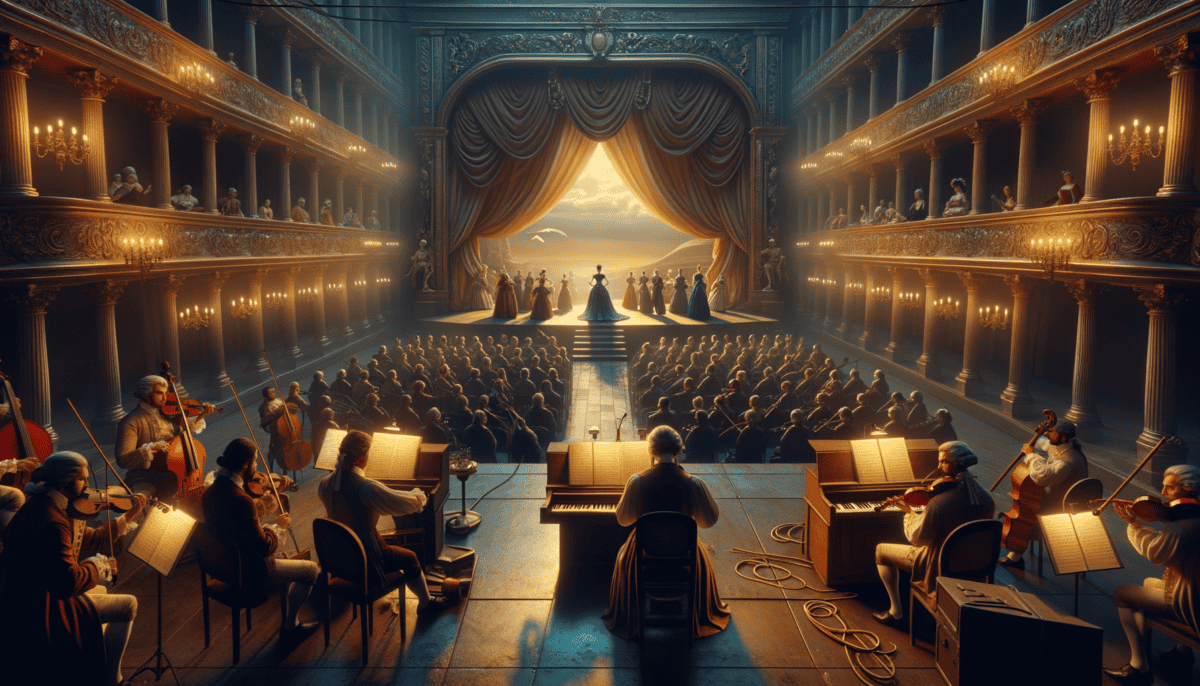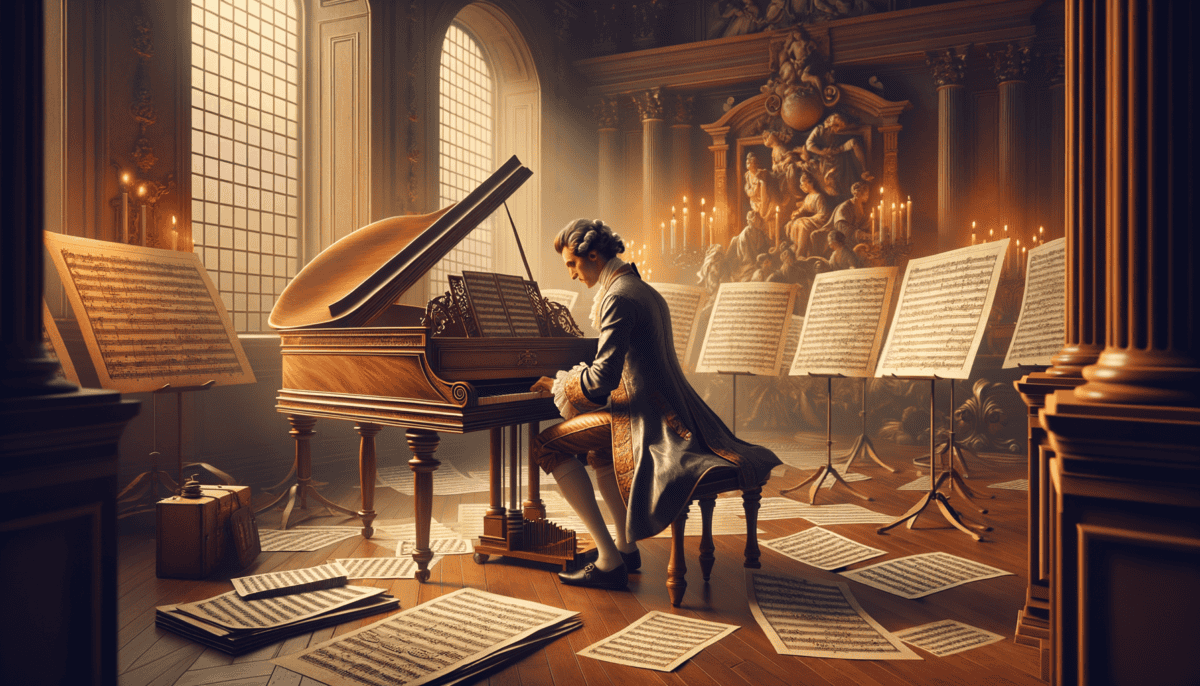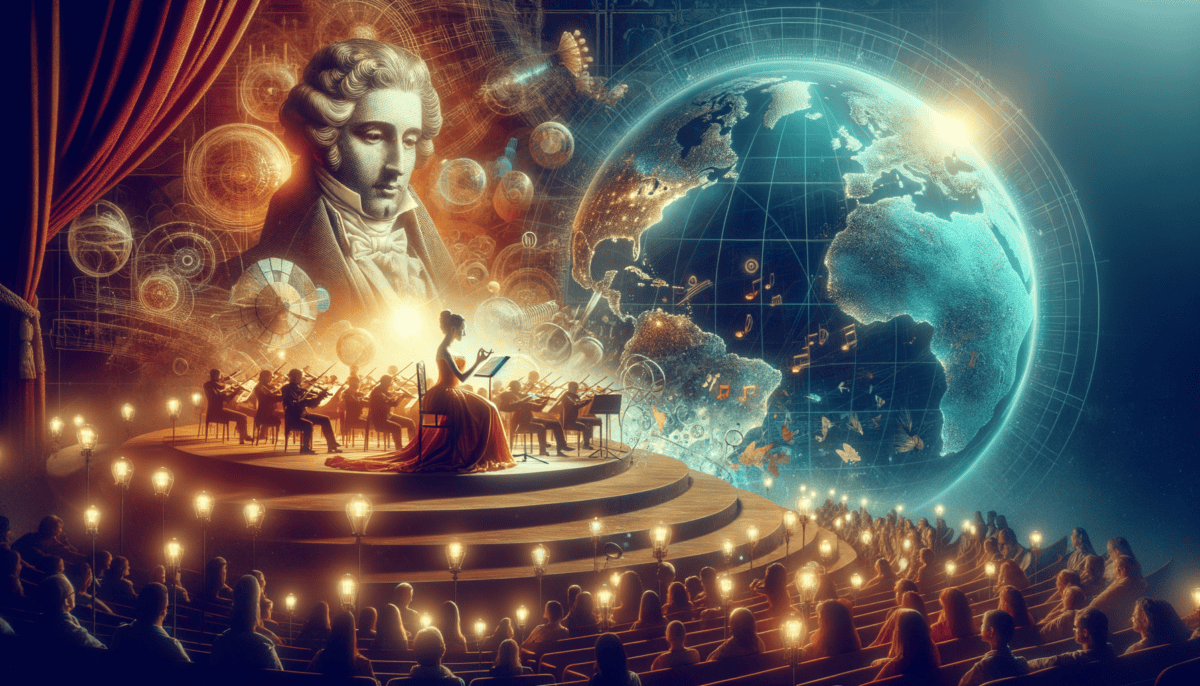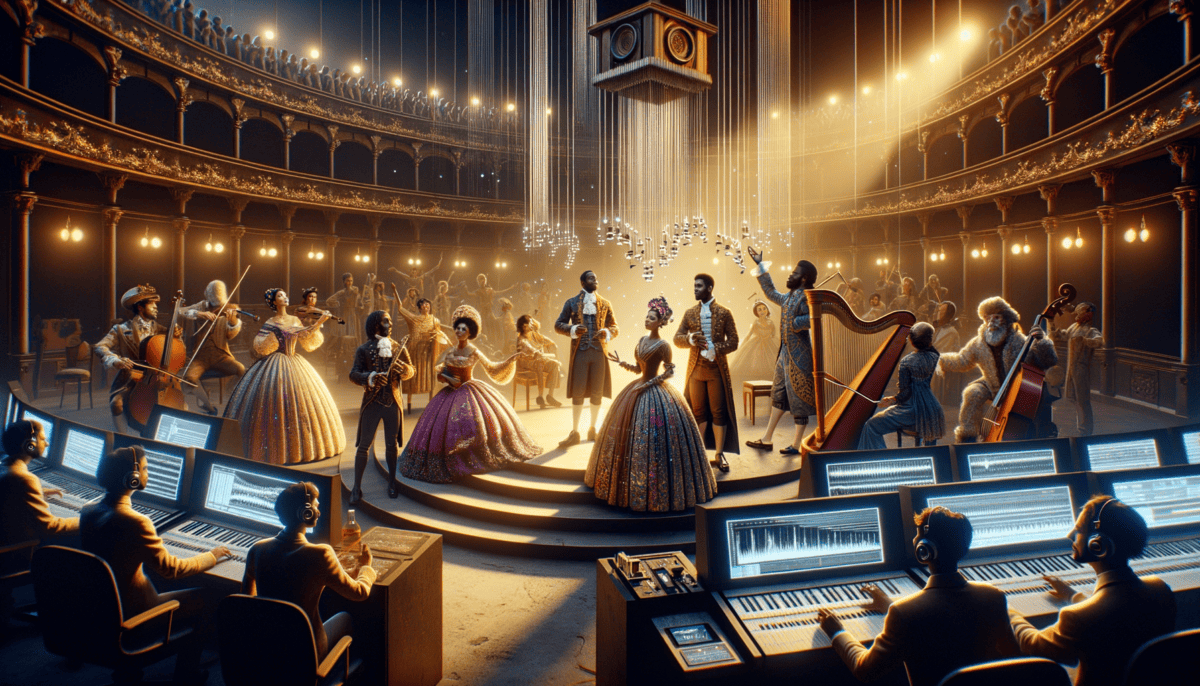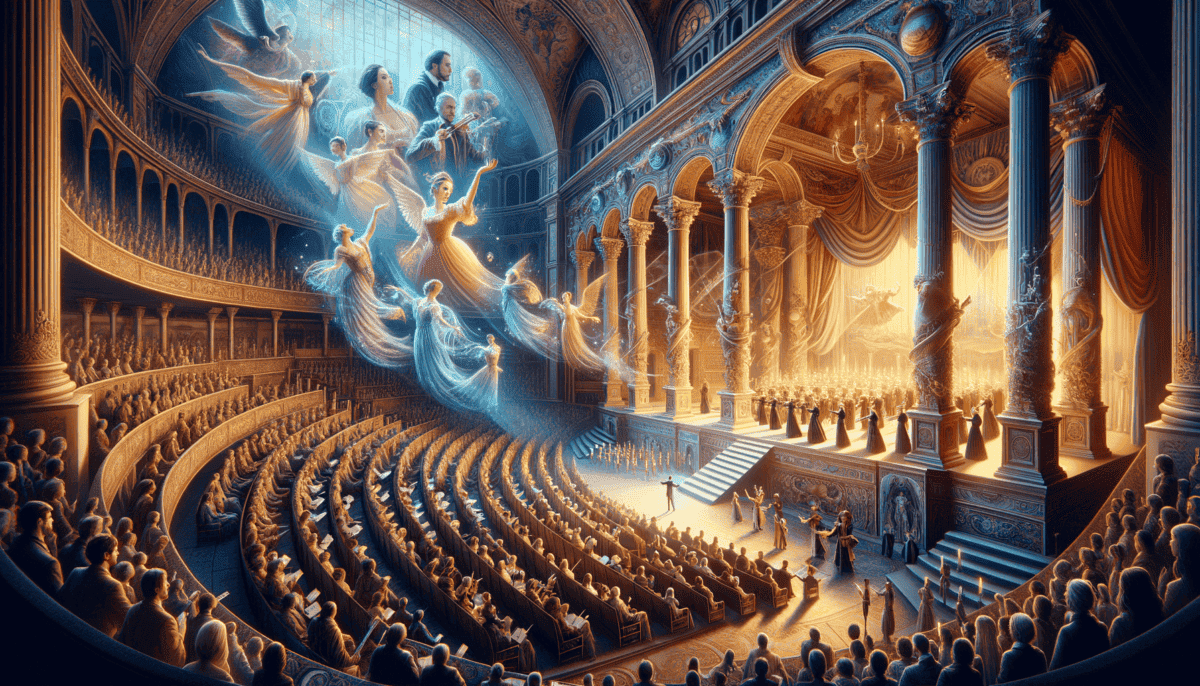The Musical Birthplace
Once upon a time, in a beautiful city called Florence, something magical happened. It was the year 1597, and people were about to discover a whole new way to tell stories with music!
Little Marco lived in Florence with his family. His father worked at the grand Palazzo Pitti, where important people would meet to talk about art and music. One day, Marco sneaked into a special room where musicians were trying something new.
“What are they doing, Papa?” Marco whispered, tugging at his father’s sleeve.
“They’re creating something wonderful, piccolo mio,” his father smiled. “They’re making stories come alive with singing!”
Two men named Jacopo Peri and Ottavio Rinuccini were the clever artists behind this new idea. Jacopo wrote the music, while Ottavio wrote the words. They wanted to make stories from ancient Greece feel new and exciting.
Marco watched as singers practiced their parts. They didn’t just sing – they moved around like actors in a play! The musicians played special instruments that made the story feel real:
- Sweet-sounding harps
- Gentle flutes
- Big drums for exciting moments
- Stringed instruments that sounded like singing
The singers wore beautiful costumes that sparkled in the candlelight. Their voices filled the room with sounds that made Marco feel like he was floating on clouds.
Everyone in Florence got excited about this new way of making music. Rich families would invite their friends to watch these musical stories. They called it “opera,” which means “work” in Italian, but it was more like magic than work!
Soon, other cities in Italy wanted to have operas too. Musicians started writing new stories with music, and singers practiced hard to make their voices sound perfect. Even children like Marco began dreaming about being part of these amazing shows.
The best part? Opera helped people understand feelings that were hard to explain with just words. When someone was happy, sad, or in love, the music made you feel it too!
Marco’s favorite part was watching the scenery change. Artists painted beautiful backgrounds that could move and change during the show. There were forests, palaces, and even scenes with gods coming down from the clouds!
As more people learned about opera, they started adding new ideas. Some added ballet dancers, others made fancy costumes with real gold thread. The shows got bigger and more exciting with each performance.
Marco grew up watching opera become more and more popular. He remembered that special day when he first heard the magical sounds in the palace. Now, whenever he heard opera music, he thought about how lucky he was to see it all begin.
The story of opera had started in Florence, but it was just the beginning of a beautiful journey that would spread music and stories all around the world.
Royal Entertainment and Grand Spectacles
Opera grew bigger and fancier! Kings and queens loved it so much, they built special theaters just for opera shows.
Little Isabella watched with wide eyes as workers transformed the palace courtyard. They were getting ready for the biggest show anyone had ever seen!
“Look at all those sparkly things!” Isabella gasped, pointing at the glittering decorations.
A famous composer named Claudio Monteverdi was in charge of the music. He made the orchestra bigger and added new instruments. The music became richer and more exciting than ever before!
The singers were special too. Some boys trained their voices to sing very high notes, even as grown-ups. They were called castrati, and they sounded like angels singing from heaven.
The shows got more amazing with:
- Flying machines that lifted singers into the air
- Trap doors for surprise appearances
- Fake waves and moving clouds ☁️
- Costumes covered in real jewels
- Hundreds of candles for lighting ✨
Different countries started making their own kinds of opera. In France, they added lots of dancing. In Italy, they loved beautiful singing with lots of trills and fancy notes.
Isabella’s favorite part was watching the stage change. One minute it would be a palace, then WHOOSH! It became a forest or the ocean!
The stories got bigger too. Instead of just tales from ancient Greece, there were stories about:
“Kings and queens! Dragons and knights! Love stories and great adventures!”
People came from far away to see these amazing shows. Rich families would dress up in their fanciest clothes and jewelry to attend. It was like going to the biggest party ever!
Special effects made the shows magical. Thunder machines rumbled during storm scenes. Wind machines whooshed during sea adventures. Fire effects blazed during dramatic moments!
Isabella loved watching the singers practice. Their voices could fill the huge theaters without any microphones! They trained for many years to sing so powerfully.
Each new opera tried to be more spectacular than the last. Composers wrote harder music. Set designers built bigger stages. Costume makers used more sparkly decorations.
Even the orchestra got fancier. They added new instruments from far-away places. The music became richer and more colorful, painting pictures with sound.
Isabella dreamed of being part of these magical shows. Maybe one day she would sing on stage or help make the beautiful costumes. Opera was growing and changing, becoming more wonderful every year!
As the sun set behind the palace, another amazing show was about to begin. The candles were lit, the curtains were ready, and the magic of opera was about to fill the air once again. ✨
Magic and Music: Mozart’s New Opera World
A young boy named Wolfgang sat at his piano, his fingers dancing across the keys. He wasn’t just any boy – he was Wolfgang Amadeus Mozart, and he was about to change opera forever!
“Music should make people feel something in their hearts,” Mozart would say. He wrote stories about real people with real feelings, not just gods and heroes.
“Even kings and servants can fall in love,” Mozart smiled as he wrote his music. “Everyone has feelings!”
Opera was changing. Instead of just playing for kings and queens, shows opened for everyone! People from all over town could buy tickets to see the magic.
- Happy songs that made people laugh
- Sad songs that made people cry
- Funny characters who told jokes
- Beautiful love stories
- Magical stories with dragons and birds
One of Mozart’s most famous operas was “The Magic Flute.” It had a brave prince, a magical flute, and a queen who could sing super high notes! ✨
Different countries started making their own special kinds of opera. They used their own languages and told stories about their own heroes.
In Germany, they loved big, powerful music. In Italy, they liked beautiful melodies that floated like butterflies. In France, they added lots of dancing!
The orchestra got bigger too. Mozart wrote music for more instruments, making the sound rich and colorful. It was like painting with music!
People didn’t just sit quietly during shows anymore. They clapped and cheered when they liked something. Sometimes they even asked singers to repeat their favorite songs!
“Bravo! Bravo!” they would shout when a singer hit an especially beautiful note.
Mozart wrote operas about all kinds of people. His stories showed that everyone’s feelings matter, whether they were rich or poor, young or old.
In “The Marriage of Figaro,” he told a funny story about servants who were smarter than their masters. People loved seeing characters just like themselves on stage!
Other composers started following Mozart’s example. They wrote operas about real people and real feelings too. The stories became more interesting and the music more beautiful.
Opera houses opened in more cities. Now people didn’t have to travel far to see shows. More singers learned to perform, and more musicians joined orchestras.
As Mozart’s music spread around the world, it showed everyone that opera could be fun, exciting, and full of feelings. His magical musical stories still make people happy today!
The stage was set for even bigger changes. New composers were ready to take opera in exciting new directions, telling more stories and touching more hearts with their music.
World Stages and Passionate Tales
The curtains rise on a new chapter of opera history! Two amazing composers, Giuseppe Verdi and Richard Wagner, are about to make opera bigger and better than ever before!
Verdi loved to write music about brave heroes and strong feelings. His operas were like exciting movies with wonderful songs. People couldn’t help but sing along!
“Music should make your heart beat faster,” Verdi would say. And his music did just that!
Meanwhile, in Germany, Wagner was dreaming up something different. He built a special theater just for his operas. Some of his shows lasted all day long!
Opera was spreading all over the world! New opera houses opened in:
- New York City’s Metropolitan Opera House
- Sydney’s beautiful harbor theater ️
- Moscow’s grand Bolshoi Theater ⭐
- London’s Royal Opera House
- Milan’s famous La Scala
The stories got more exciting too. Verdi wrote about a sad clown in “Rigoletto” and a brave princess in “Aida.” Wagner told tales about magic rings and flying warriors! ✨
The music got bigger and louder. More instruments joined the orchestra. Some opera houses needed 100 musicians to play all the parts!
Singers had to learn new ways to use their voices. They needed to be heard over the big orchestras. Some singers became as famous as movie stars! ⭐
“Every voice tells a story,” a famous singer once said. “And every story needs its perfect voice.”
People came from far away to see these shows. They dressed in their best clothes and brought little telescopes called opera glasses to see the stage better!
Opera started telling stories about real life problems. Verdi wrote about people fighting for freedom. Wagner wrote about love and magic. The music helped tell these big stories.
New machines made special effects possible. Stages could now show storms, fire, and even flying horses! It was like magic right before your eyes! ✨
People all over the world fell in love with opera. They learned Italian, German, and French just to understand the songs better!
Some countries started writing operas in their own languages. Russian composers wrote about their fairy tales. English composers told stories about their history.
Opera was changing the world with its beautiful music and exciting stories. But even bigger changes were coming! New ideas and new technology would soon make opera even more amazing!
Opera’s New World
Opera has zoomed into the future! Today’s opera looks and sounds very different from long ago. Let’s peek behind the curtain to see what’s new!
Big screens help everyone see the action better. Some opera houses put up giant TV screens above the stage. Even if you sit far away, you can see every smile and tear!
“Technology helps us share opera with more people than ever before,” says Sarah, a modern opera singer. “It’s like magic!”
Famous opera houses are getting makeovers too. The Sydney Opera House sparkles with new lights. The Met in New York has comfy new seats. Everyone can enjoy the show in style! ✨
New composers are writing exciting operas about:
- Space adventures
- Modern family stories
- Superhero tales ♀️
- Robot friends
- Magic school days
Opera is for everyone now! Kids get special shows made just for them. Schools bring whole classes to watch. Some places even let you wear jeans to the opera!
Different kinds of music mix together in new operas. You might hear jazz, rock, or pop mixed with old opera songs. It’s like a musical rainbow!
“We want everyone to feel welcome at the opera,” says Marco, a theater manager. “Opera is about feeling the music in your heart!”
Special programs help young singers learn opera. They practice every day and dream of singing on big stages. Some start when they’re just kids!
Opera houses work hard to save energy and help the earth. They use special lights that don’t get hot. Some even have solar panels on their roofs!
New operas tell stories about different cultures. Singers wear traditional clothes and sing in many languages. It’s like taking a trip around the world!
Some shows mix opera with dance, circus acts, and puppet shows. Every performance is a surprise! You never know what amazing things you’ll see!
Opera keeps changing and growing. But one thing stays the same – it still makes people feel big feelings and dream big dreams. The future of opera looks bright and beautiful! ✨
The next part of our story takes us on a journey to see how opera touches hearts all around the world. Get ready for more musical magic!
Opera’s Eternal Song
The world of opera sparkles brighter than ever! Let’s explore how this amazing art keeps singing into the future!
Little Maria watches an opera on her tablet. Her eyes grow wide as the music fills her room. “Mommy, I want to sing like that!” she says with joy.
“Opera is like a magical bridge that connects people from all over the world,” says Carlos, a young opera student. “When we sing, we share our hearts!”
Special opera games help kids learn about music. They can dress up like famous singers and create their own shows!
Here are some cool ways opera makes the world better:
- Bringing joy to hospitals
- Teaching kids about music
- Making new friends across countries
- Telling important stories
- Keeping old songs alive ⭐
Opera singers travel everywhere! They sing in tiny towns and big cities. Some even sing on boats and trains!
Young composers write operas about things kids love today. There are operas about pandas, dinosaurs, and even space robots!
“Every time someone new falls in love with opera, our music family grows bigger,” says Lisa, an opera director. “It’s like adding new stars to the sky!”
Opera houses save old costumes and props in special museums. People can touch real opera treasures from long ago!
Opera singers use their voices to help make the world better. They sing at special events to help people in need. Music can change lives!
Opera brings happiness to everyone who hears it. It tells stories that make us laugh, cry, and dream big dreams!
From its birth in Italy long ago to today’s amazing shows, opera keeps growing and changing. But it always stays magical! ✨
The story of opera is like a beautiful song that goes on forever. Every new singer, every new show, adds another lovely note. And that’s the most wonderful thing about opera – it belongs to everyone who loves it!


